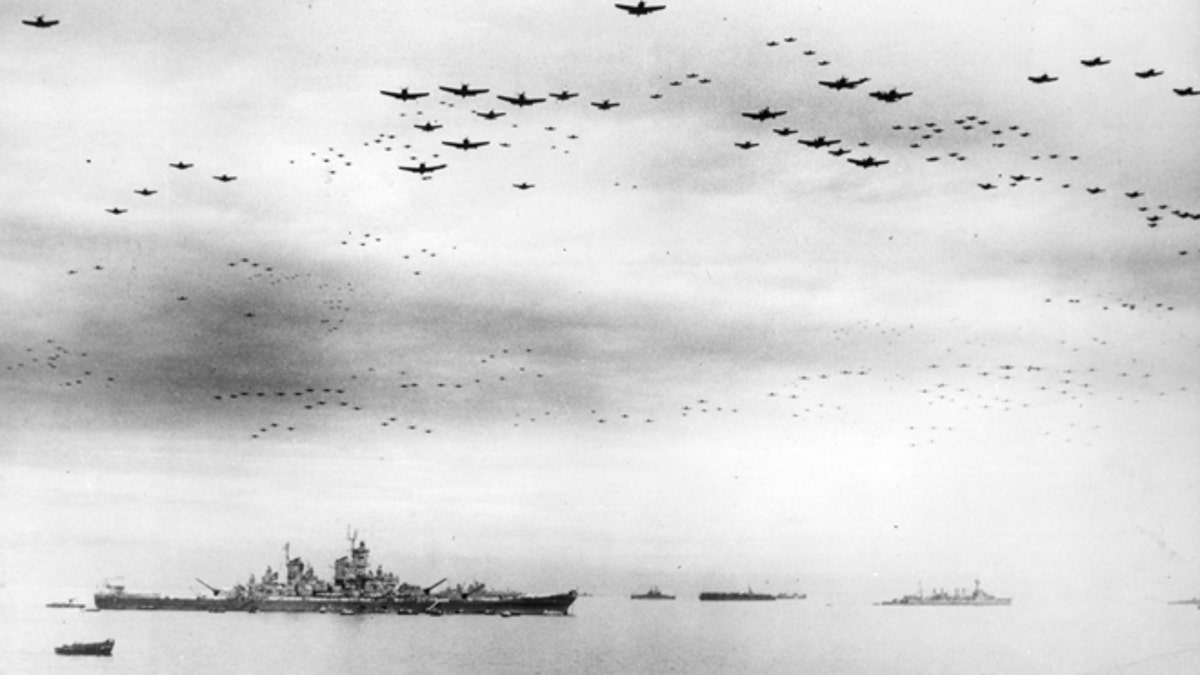
Seventy years ago, on Sept. 2, 1945, Gen. Douglas MacArthur, the supreme commander of Allied powers in the Pacific, stood on the deck of the battleship USS Missouri in Tokyo Bay and formally accepted the surrender of Imperial Japan. It marked the end of World War II, history’s bloodiest war, which killed more than 60 million people, including 400,000 Americans.
MacArthur uniquely embodied the Allied war effort for Americans. For a period in the hopeless early days of war, he was the only Allied commander successfully resisting fascist power anywhere in the world — leading besieged troops on the Bataan Peninsula in the Philippines in a valiant but doomed mission to buy time for others to resist elsewhere. He then led the long fight back from the South Pacific to Tokyo Bay.
Liberal historians have damaged the reputation of the brilliant but egotistical general. Furthermore, his battles are less known today than bloodbaths like Iwo Jima and Okinawa, in part because MacArthur was stingier than most other commanders with the lives of his troops. But he was a singular figure for Americans then, and he remains so for Pacific historians today.
After the ceremony, MacArthur addressed the American people. He said: “Today the guns are silent. A great tragedy has ended. A great victory has been won. The skies no longer rain death … men everywhere walk upright in the sunlight.”
Victory did not usher in the end of all war. It did not make America the policeman of the world — a role we have never wanted and would never accept. But it enshrined an economic and military supremacy that has lasted until now
Of those who secured victory, MacArthur said: “I speak for the unnamed brave millions homeward bound to take up the challenge of that future which they did so much to salvage from the brink of disaster … Their spiritual strength and power has brought us through to victory … take care of them.”
Of course, history would later show that they took care of us. That greatest generation, as they would come to be known, was determined to preserve what was won at such immense cost in war.
The actions they took and the decisions they made kept America safe. None desired another war or relished confrontation. But they instinctively grasped the need to stop enemies before they reached our shores.
Many in that generation looked up to the man who was their military’s commander in chief for most of the war, President Franklin Roosevelt. Even before the war, some shared the view that Roosevelt privately held. In the 1930s era of isolationism — when the experts could cite any number of reasons to do as little as possible — Roosevelt knew that the United States could not ultimately excuse itself from all of the tribulations of the world. He knew that doing nothing would mean a future where Americans would contend hopelessly and desperately with a totalitarian world.
Victory did not usher in the end of all war. It did not make America the policeman of the world — a role we have never wanted and would never accept. But it enshrined an economic and military supremacy that has lasted until now, and which has benefited not just Americans, but all who value freedom and security. Even those who are not our friends benefit from the freedom of navigation provided by our navy’s supremacy.
The United States as victor, and Japan as vanquished, both conducted themselves unusually by historical standards. MacArthur essentially became a proconsul of occupied Japan, but he governed magnanimously. Japan focused on rebuilding, not resisting, and made itself one of the most prosperous societies in history. It also became one of America’s most important allies. Japan today hosts several massive U.S. bases and picks up $2 billion of their tab annually. The U.S.-Japan alliance is the most important in deterring a Chinese government that regrettably has embarked on expansionist adventures unseen in the region since 1945.
These have been the pillars of postwar security — the world that came into existence 70 years ago today and that we in subsequent generations have known exclusively during our lives. This order has depended on alliances with nations that share our values, a strong military and a supreme navy. The simplicity of the formula is one of its many virtues.
Only recently has this order been drawn into question more and more seriously. We have had crises before, but seldom have so many foreign threats emerged so rapidly. Our military is strong but diminished, and our navy has the fewest ships since before World War I. In addition, the foreign threats we face are abetted at home by economic stagnation; racial and class division induced by politicians; and leaders who pay lip service to America, but who don’t really believe in this country the way the World War II generation did.
On this anniversary, and as a new political season begins here in America, we ought to give these developments more than a passing thought. There is far more at stake than patriotic pride should we truly part with the order that has existed since 1945.
We should also pause to remember the price the world paid for the security we inherited. In his speech that day, MacArthur hauntingly said: “I speak for the thousands of silent lips, forever stilled among the jungles and the beaches and in the deep waters of the Pacific which marked the way.”








































